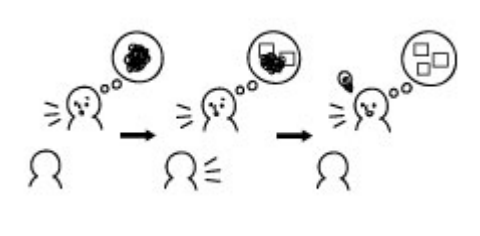Difference between revisions of "Release of Thought/OG"
Sfrancisco (talk | contribs) (Created pattern in original format) |
Sfrancisco (talk | contribs) (Added source) |
||
| Line 5: | Line 5: | ||
|image= <!-- Provide the filename of the image to be displayed (e.g., Design_pattern.png) --> | |image= <!-- Provide the filename of the image to be displayed (e.g., Design_pattern.png) --> | ||
|contributor= [[Takashi Iba]], [[Toko Miyake]], [[Miyuko Naruse]], [[Natsumi Yotsumoto]] | |contributor= [[Takashi Iba]], [[Toko Miyake]], [[Miyuko Naruse]], [[Natsumi Yotsumoto]] | ||
|source= Iba, Miyake, Naruse & Yotsumoto (2009)<ref>Iba, T., Miyake, T., Naruse, M., & Yotsumoto, N. (2009).[https://hillside.net/plop/2009/papers/People/Learning%20Patterns%20A%20Pattern%20Language%20for%20Active%20Learners.pdf Learning patterns: A pattern language for active learners]. In Proceedings of the 16th Conference on Pattern Languages of Programs, PLoP 2009.</ref> | |source= Iba, Miyake, Naruse & Yotsumoto (2009)<ref>Iba, T., Miyake, T., Naruse, M., & Yotsumoto, N. (2009).[https://hillside.net/plop/2009/papers/People/Learning%20Patterns%20A%20Pattern%20Language%20for%20Active%20Learners.pdf Learning patterns: A pattern language for active learners]. In Proceedings of the 16th Conference on Pattern Languages of Programs, PLoP 2009.</ref>; Iba (2010)<ref>Patlet mentioned in Iba, T. (2010). [https://pdfs.semanticscholar.org/6e59/51c886e73a6efdc88f7be185d2f9336025ef.pdf Designing a Pattern Language for Creative Learners].</ref> | ||
|dataanalysis= <!-- If applicable, list of data analyses used for mining the pattern separated by a " , "comma --> | |dataanalysis= <!-- If applicable, list of data analyses used for mining the pattern separated by a " , "comma --> | ||
|domain= <!-- Learning domain the design pattern belongs to (e.g., General, Math, Algebra) --> | |domain= <!-- Learning domain the design pattern belongs to (e.g., General, Math, Algebra) --> | ||
Revision as of 14:38, 16 February 2017
| Release of Thought | |
| Contributors | Takashi Iba, Toko Miyake, Miyuko Naruse, Natsumi Yotsumoto |
|---|---|
| Last modification | February 16, 2017 |
| Source | Iba, Miyake, Naruse & Yotsumoto (2009)[1]; Iba (2010)[2] |
| Pattern formats | OPR Alexandrian |
| Usability | |
| Learning domain | |
| Stakeholders | |
When you are making research
When you are studying
When you are at a dead end
When you have no idea what to do
When you are writing a paper
You cannot organize or improve your vague ideas for yourself.
- • It is difficult to explain a subject what a person doesn't understand.
- • It is difficult to understand the story that is not organized logically.
- • People need to organize their idea to make other people understand.
- • People often can't notice their lack of understanding.
- • Finding what we don‟t understand is good way to know what we should understand next.
Talk with somebody and sophisticate your thought, looking his/her reaction carefully.
- • Find someone who would listen your thoughts and talk what you think.
- • If he/she can't understand your idea, explain and rephrase it. If the person seems to have an interest in your thoughts, try to explain that part more.
- • Reflect on the good things and the bad things about your presentation.
- • Try to tell your thoughts to other people. Keep trying to express your thoughts attractively.
You can organize your ideas when you choose words to explain your thought. Your ideas will be polished in the process of talking.
Tenshin thought of himself as a professional of Social System Theory. One day, one of his friends asked about Social System Theory to him, and he answered to that question. Tenshin thought his answer was perfect, but his friend didn't seem to understand. Tenshin realized his understanding was not enough, and some parts of understanding were vague.
So Tenshin tried to organize his understanding again, and explained to someone about Social System Theory again and again. This leaded him to get refined his ability to explain and understand Social System Theory more deeply.
Talking about your unclear thoughts can be considered Prototyping (Prototyping) of thoughts. Doing “trial and error” is effective for your Attractive Expression. Furthermore, making Community of Learning (Community of Learning) brings more chances to Release of Thought . Release of Thought is also key nature of Learning by Teaching.
References
- ↑ Iba, T., Miyake, T., Naruse, M., & Yotsumoto, N. (2009).Learning patterns: A pattern language for active learners. In Proceedings of the 16th Conference on Pattern Languages of Programs, PLoP 2009.
- ↑ Patlet mentioned in Iba, T. (2010). Designing a Pattern Language for Creative Learners.
